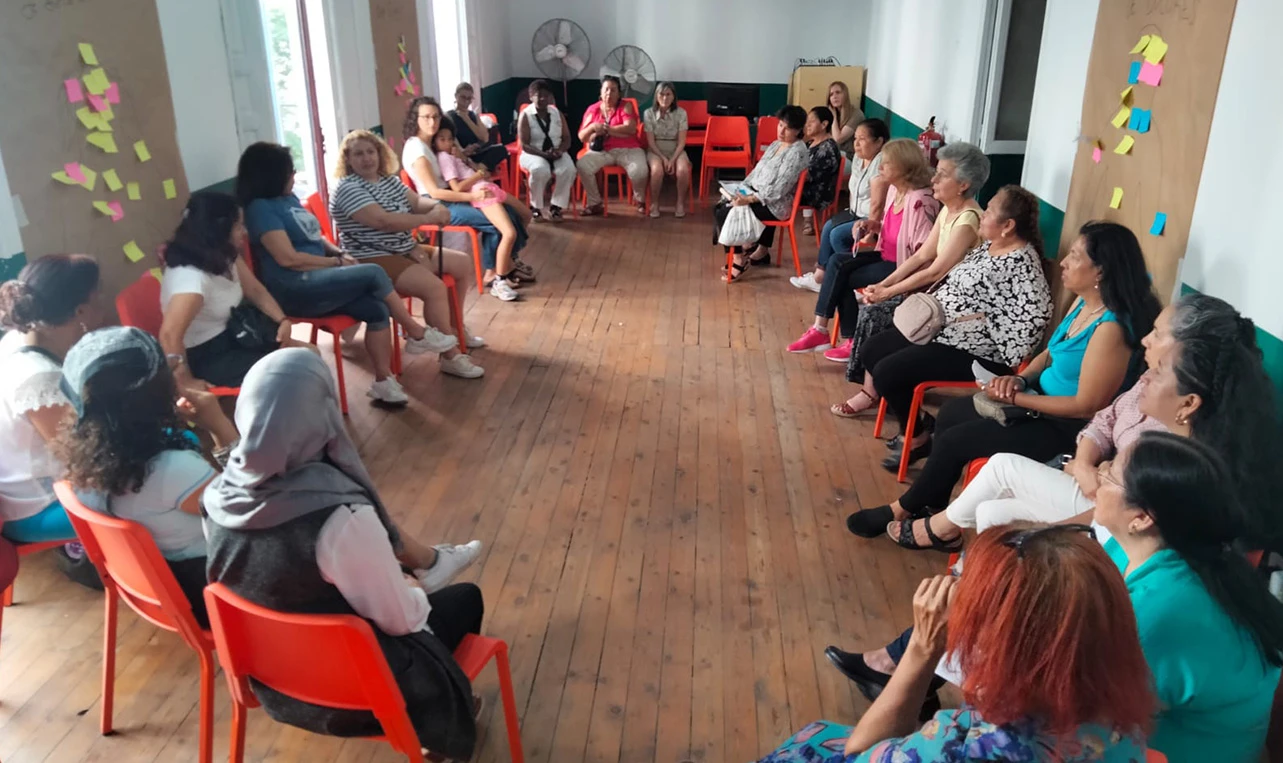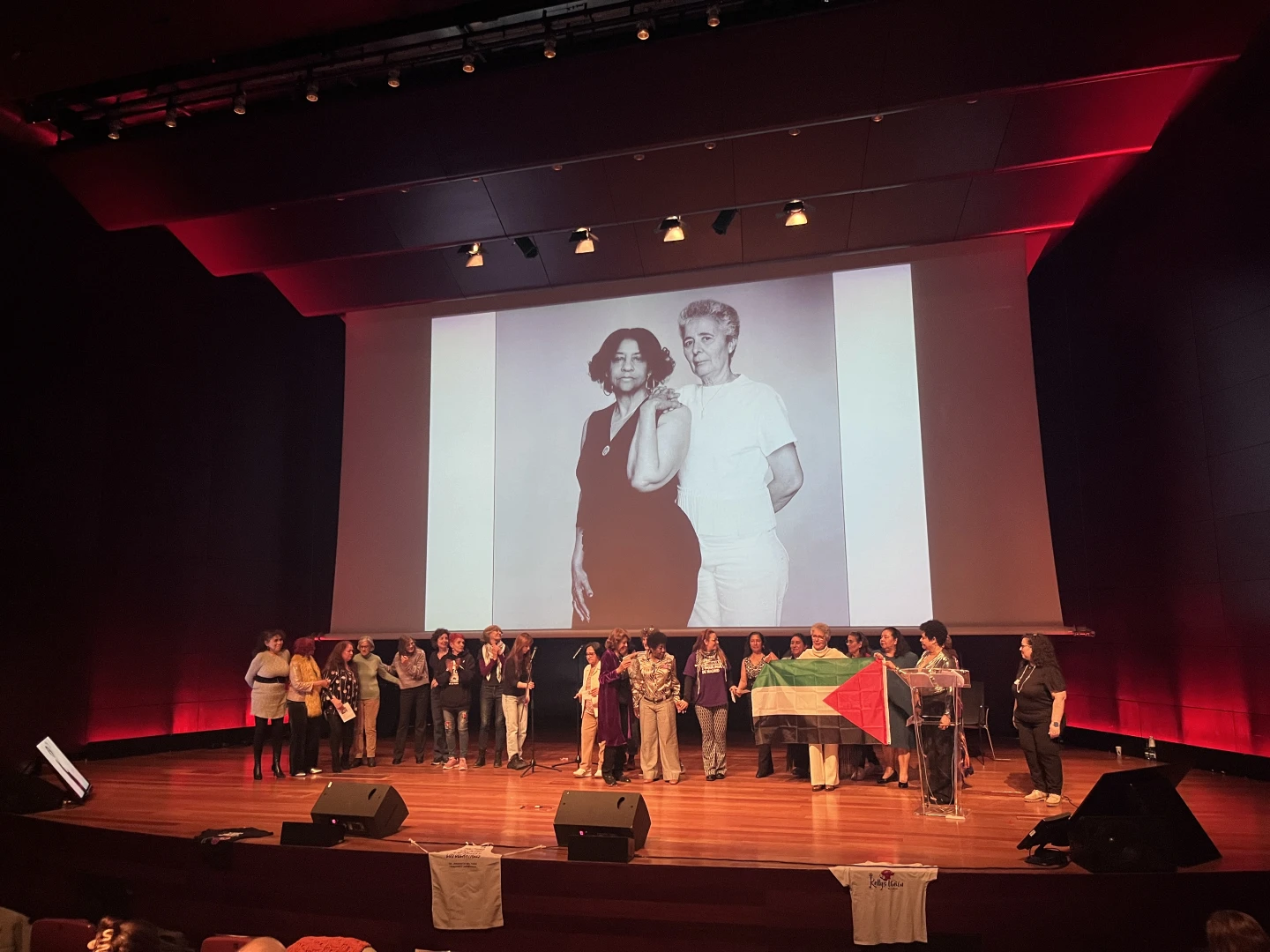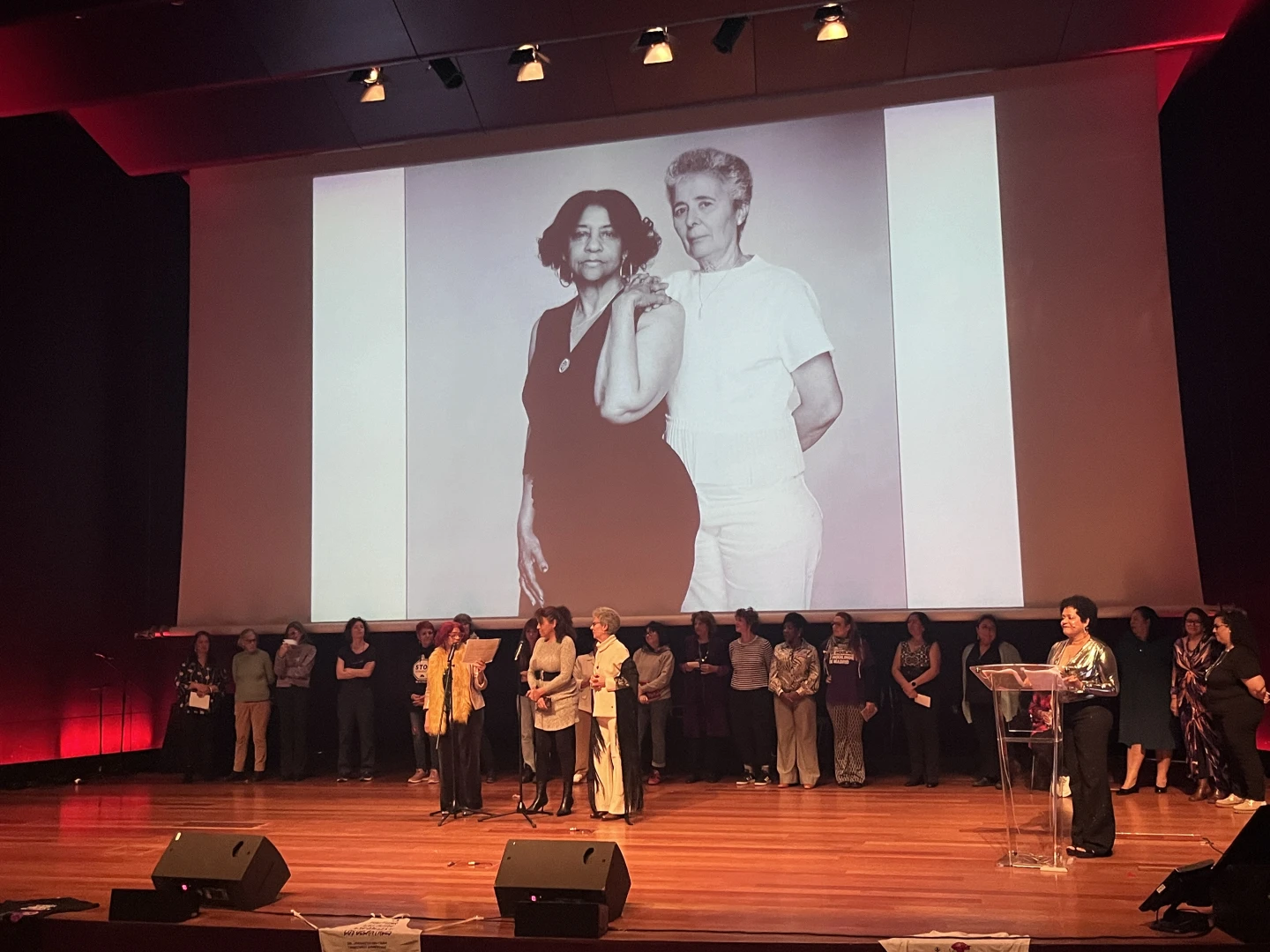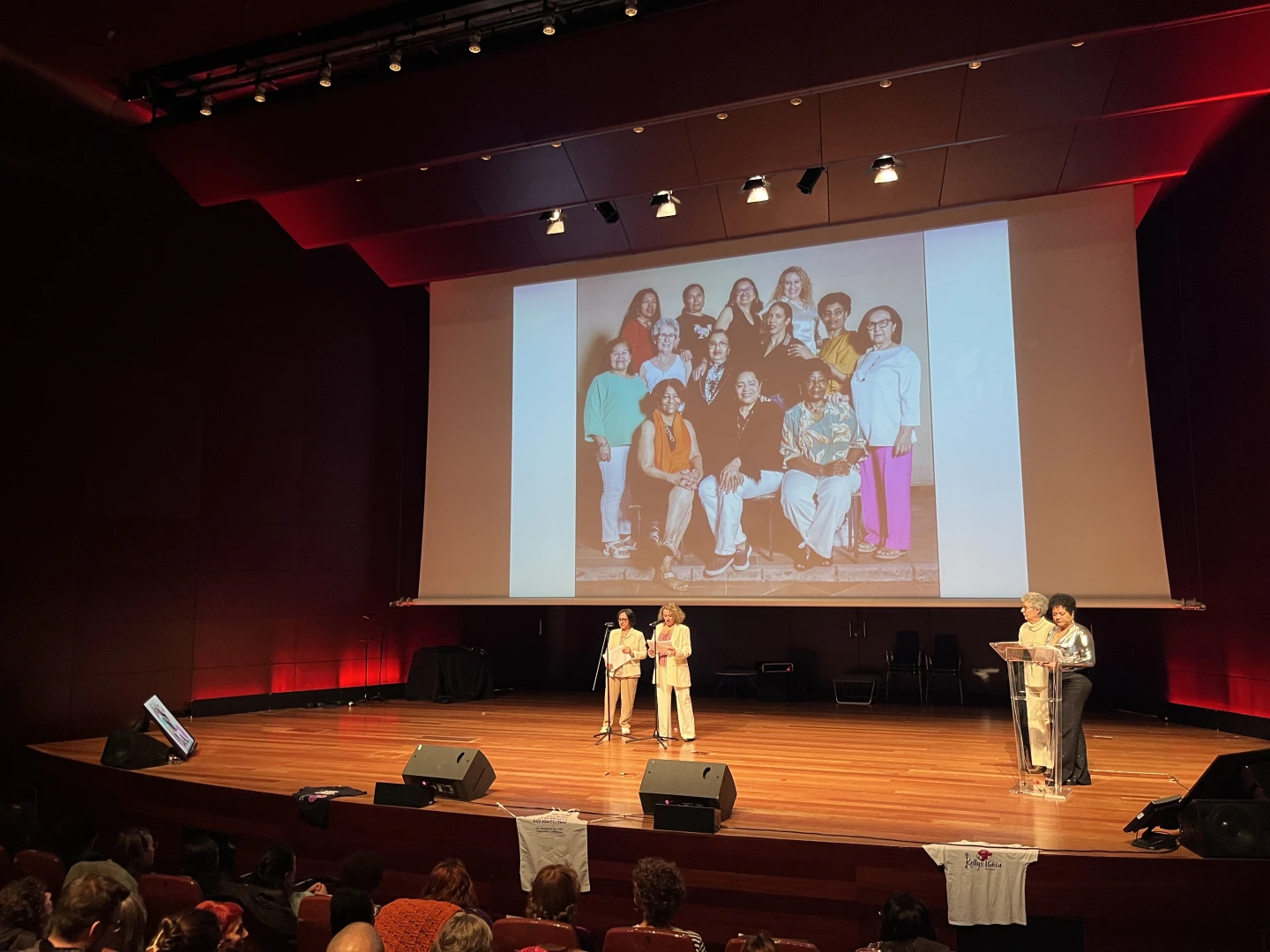
Work session held between Kellys Unión Madrid and Territorio Doméstico, 2024. Photograph: Sinnosotras
Held on 30 Nov 2024
On 9 June 2022, Spain’s Congress of Deputies approved the ratification of Convention 189 in relation to decent employment for domestic workers, advocated by the International Labour Organisation (ILO). This significant victory was the outcome of years of struggle and the organisation of workers, who finally witnessed a commitment from the Spanish State to address their labour demands and acknowledge their work. Nevertheless, this road is not at its end and this commitment must materialise in the development of legislation and public policies related to care.
In the same vein of the struggle to improve labour conditions, the Kellys have spent years making the realities they face visible and calling for changes. Within the field of occupational health, they have obtained significant advances in gaining recognition for illnesses such as carpal tunnel syndrome, bursitis and epicondylitis, or “tennis elbow”, ailments associated with the repetitive movement of the arms and hands demanded by day-to-day work.
Within this context, the encounter here prolongs this struggle, fostering alliances between different collectives of female workers in the field of domestic work and care, cleaning, nursing, hotel cleaning — many of whom are migrants and racialised — who are responsible for caring for life. Together, these women seek to open a social dialogue on the need to recognise professional illnesses and occupational health in care-related and cleaning sectors. These jobs are still socially undervalued, which translates into widespread precarity: low salaries, limited health and safety prevention at work and no recognition for illnesses or the repercussions associated with such positions, for instance respiratory problems owing to contact with toxic products, physical injuries, chronic pain, among other health issues, which hinder access to dignified benefits that ensure adequate living conditions.
The encounter gets under way with a round-table discussion and presentation, where the different collectives of the participating female workers share their reflections, evaluations and analyses, as well as specific proposals to improve labour conditions and health, from social struggle and strategies of happiness. It culminates in a performance by Territorio Doméstico and a concert by the singer Ro Tirita, accompanied by the guitar of La Tomi, with both performing songs from the band Sudor Marika and other cumbias to dance to.
Organised by
Ro Tirita (Sudor Marika) and La Tomi
More information
Organised by
Museo Situado, Territorio Doméstico and Kellys Unión Madrid
Agenda
sábado 30 nov 2024 a las 18:30
Round table: Our Health at the Centre
Participants: Kellys Unión Madrid, Territorio Doméstico, SEDOAC (Servicio Doméstico Activo) and Plataforma Unitaria del Servicio de Ayuda a Domicilio (SAD)
sábado 30 nov 2024 a las 19:30
Presentation of the scheduled work process Without Us Women the World Doesn’t Move
sábado 30 nov 2024 a las 20:00
Concert by Ro Tirita ft. La Tomi
sábado 30 nov 2024 a las 20:20
Performance-catwalk: Broken Bodies. Territorio Doméstico
Participants
Kellys Unión Madrid is an autonomous association made up of hotel cleaners who aim to give visibility to labour conditions and contribute to improving their quality of life.
Plataforma Unitaria del Servicio de Ayuda a Domicilio (SAD) is an organisation that defends home help as a universal and essential service that must be managed publicly and under dignified conditions, instead of being outsourced to private companies. Its objectives include putting forward an evaluation of labour risks in homes, the recognition of professional illnesses and early retirement prior to sixty years of age.
Ro Tirita is a singer with Sudor Marika, a queer, dissident and feminist cumbia group from Argentina.
Servicio Doméstico Activo (SEDOAC) is a group which is united by a threefold discrimination: being women, migrants and domestic and care workers. The group demands full equality and the exercise of the social, political, labour and civil rights of domestic workers. Since 2019, they have managed the Centre of Empowerment for Domestic and Care Workers (CETHYC), located in the Madrid neighbourhood of Orcasitas, a place of encounter for domestic and care workers in Madrid, and for migrant women in general and collectives that defend the rights of people at risk of social exclusion.
Territorio Doméstico is an anti-racist feminist collective of women — many of them, but not all, domestic workers — who demand the rights of domestic and care workers.



Más actividades

Difficulty. Forms and Political Effects of Deviation in Writing and Contemporary Art
23 February – 14 December 2026 – Check programme
Difficulty. Forms and Political Effects of Deviation in Writing and Contemporary Art is a study group aligned towards thinking about how certain contemporary artistic and cultural practices resist the referentiality that dominates the logics of production and the consumption of present-day art. At the centre of this proposal are the concepts of difficulty and deviation, under which it brings together any procedure capable of preventing artistic forms from being absorbed by a meaning that appears previous to and independent from its expression. By ensuring the perceptibility of their languages, difficulty invites us to think of meaning as the effect of a signifying tension; that is, as a productive and creative activity which, from the materiality of art objects, frees aesthetic experience from the representational mandate and those who participate in it from the passiveness associated with tasks of mimesis and decoding.
The economy of the referential norm translates the social logic of capitalism, where insidious forms of capturing subjectivity and meaning operate. In the early 1980s, and adopting a Marxist framework, poet Ron Silliman highlighted how this logic entailed separating language from any mark, gesture, script, form or syntax that might link it to the conditions of its production, rendering it fetichised (as if without a subject) and alienating its users in a use for which they are not responsible. This double dispossession encodes the political strategy of referential objectivity: with no subject and no trace of its own consistency, language is merely an object, that reality in which it disappears.
The political uses of referentiality, more sophisticated today than ever before, sustain the neoliberal-extractivist phase of capitalism that crosses through present-day societies politically, economically and aesthetically. Against them, fugitive artistic practices emerge which, drawing from Black and Queer studies and other subaltern critical positions, reject the objective limits of what exists, invent forms to name what lies outside what has already been named, and return to subjects the capacity to participate in processes of emission and interpretation.
Read from the standpoint of artistic work, the objective capture of referentiality may be called transparency. Viewed from a social contract that reproduces inequality in fixed identity positions, transparent in this objectivity are, precisely, the discourses that maintain the status quo of domination. Opposite the inferno of these discourses, this group aims to collectively explore, through deviant or fugitive works, the paradise of language that Monique Wittig encountered in the estranged practices of literature. For the political potency of difficulty — that is, its contribution to the utopia of a free language among equals — depends on making visible, first, its own deviations; from there, the norm that those deviations transgress; and finally, the narrowness of a norm which in no way exhausts the possibilities ofsaying, signifying, referring and producing a world.
From this denouncement of referential alienation, fetishisation and capture, Difficulty. Forms and Political Effects of Deviation in Writing and Contemporary Art turns its attention to the strategies of resistance deployed by contemporary artists and poets. Its interest is directed towards proposals as evidently difficult or evasive as those of Gertrude Stein, Lyn Hejinian, Theresa Hak Kyung Cha, Kameelah Janan Rasheed, Kathy Acker, María Salgado and Ricardo Carreira, and as seemingly simple as those of Fernanda Laguna, Felix Gonzalez Torres and Cecilia Vicuña, among other examples that can be added according to the desires and dynamics of the group.
The ten study group sessions, held between February and December, combine theoretical seminars, work with artworks from the Museo Reina Sofía’s Collections and exhibitions, reading workshops and public programs. All these formats serve as spaces of encounter to think commonly about certain problems of poetics — that is, certain political questions — of contemporary writing and art.
Difficulty. Forms and Political Effects of Deviation in Writing and Contemporary Art inaugurates the research line Goodbye, Representation, through which the Museo Reina Sofía’s Studies Directorship seeks to explore the emergence of contemporary artistic and cultural practices which move away from representation as a dominant aesthetic-political strategy and redirect their attention toward artistic languages that question the tendency to point, name and fix, advocating instead for fugitive aesthetics. Over its three-year duration, this research line materializes in study groups, seminars, screenings and other forms of public programming.

Institutional Decentralisation
Thursday, 21 May 2026 – 5:30pm
This series is organised by equipoMotor, a group of teenagers, young people and older people who have participated in the Museo Reina Sofía’s previous community education projects, and is structured around four themed blocks that pivot on the monstrous.
This fourth and final session centres on films that take the museum away from its axis and make it gaze from the edges. Pieces that work with that which is normally left out: peripheral territories, unpolished aesthetics, clumsy gestures full of intent. Instead of possessing an institutional lustre, here they are rough, precarious and strange in appearance, legitimate forms of making and showing culture. The idea is to think about what happens when central authority is displaced, when the ugly and the uncomfortable are not hidden, when they are recognised as part of the commons. Film that does not seek to be to one’s liking, but to open space and allow other ways of seeing and inhabiting the museum to enter stage.

Intergenerationality
Thursday, 9 April 2026 – 5:30pm
This series is organised by equipoMotor, a group of teenagers, young people and older people who have participated in the Museo Reina Sofía’s previous community education projects, and is structured around four themed blocks that pivot on the monstrous.
The third session gazes at film as a place from which to dismantle the idea of one sole history and one sole time. From a decolonial and queer perspective, it explores films which break the straight line of past-present-future, which mix memories, slow progress and leave space for rhythms which customarily make no room for official accounts. Here the images open cracks through which bodies, voices and affects appear, disrupting archive and questioning who narrates, and from where and for whom. The proposal is at once simple and ambitious: use film to imagine other modes of remembering, belonging and projecting futures we have not yet been able to live.

Remedios Zafra
Thursday March 19, 2026 - 19:00 h
The José Luis Brea Chair, dedicated to reflecting on the image and the epistemology of visuality in contemporary culture, opens its program with an inaugural lecture by essayist and thinker Remedios Zafra.
“That the contemporary antifeminist upsurge is constructed as an anti-intellectual drive is no coincidence; the two feed into one another. To advance a reactionary discourse that defends inequality, it is necessary to challenge gender studies and gender-equality policies, but also to devalue the very foundations of knowledge in which these have been most intensely developed over recent decades—while also undermining their institutional support: universities, art and research centers, and academic culture.
Feminism has been deeply linked to the affirmation of the most committed humanist thought. Periods of enlightenment and moments of transition toward more just social forms—sustained by education—have been when feminist demands have emerged most strongly. Awareness and achievements in equality increase when education plays a leading social role; thus, devaluing intellectual work also contributes to harming feminism, and vice versa, insofar as the bond between knowledge and feminism is not only conceptual and historical, but also intimate and political.
Today, antifeminism is used globally as the symbolic adhesive of far-right movements, in parallel with the devaluation of forms of knowledge emerging from the university and from science—mistreated by hoaxes and disinformation on social networks and through the spectacularization of life mediated by screens. These are consequences bound up with the primacy of a scopic value that for some time has been denigrating thought and positioning what is most seen as what is most valuable within the normalized mediation of technology. This inertia coexists with techno-libertarian proclamations that reactivate a patriarchy that uses the resentment of many men as a seductive and cohesive force to preserve and inflame privileges in the new world as techno-scenario.
This lecture will address this epochal context, delving into the synchronicity of these upsurges through an additional parallel between forms of patriarchal domination and techno-labor domination. A parallel in which feminism and intellectual work are both being harmed, while also sending signals that in both lie emancipatory responses to today’s reactionary turns and the neutralization of critique. This consonance would also speak to how the perverse patriarchal basis that turns women into sustainers of their own subordination finds its equivalent in the encouraged self-exploitation of cultural workers; in the legitimation of affective capital and symbolic capital as sufficient forms of payment; in the blurring of boundaries between life and work and in domestic isolation; or in the pressure to please and comply as an extended patriarchal form—today linked to the feigned enthusiasm of precarious workers, but also to technological adulation. In response to possible resistance and intellectual action, patriarchy has associated feminists with a future foretold as unhappy for them, equating “thought and consciousness” with unhappiness—where these have in fact been (and continue to be) levers of autonomy and emancipation.”
— Remedios Zafra

27th Contemporary Art Conservation Conference
Wednesday, 4, and Thursday, 5 March 2026
The 27th Contemporary Art Conservation Conference, organised by the Museo Reina Sofía’s Department of Conservation and Restoration, with the sponsorship of the Mapfre Foundation, is held on 4 and 5 March 2026. This international encounter sets out to share and debate experience and research, open new channels of study and reflect on conservation and the professional practice of restorers.
This edition will be held with in-person and online attendance formats, occurring simultaneously, via twenty-minute interventions followed by a five-minute Q&A.